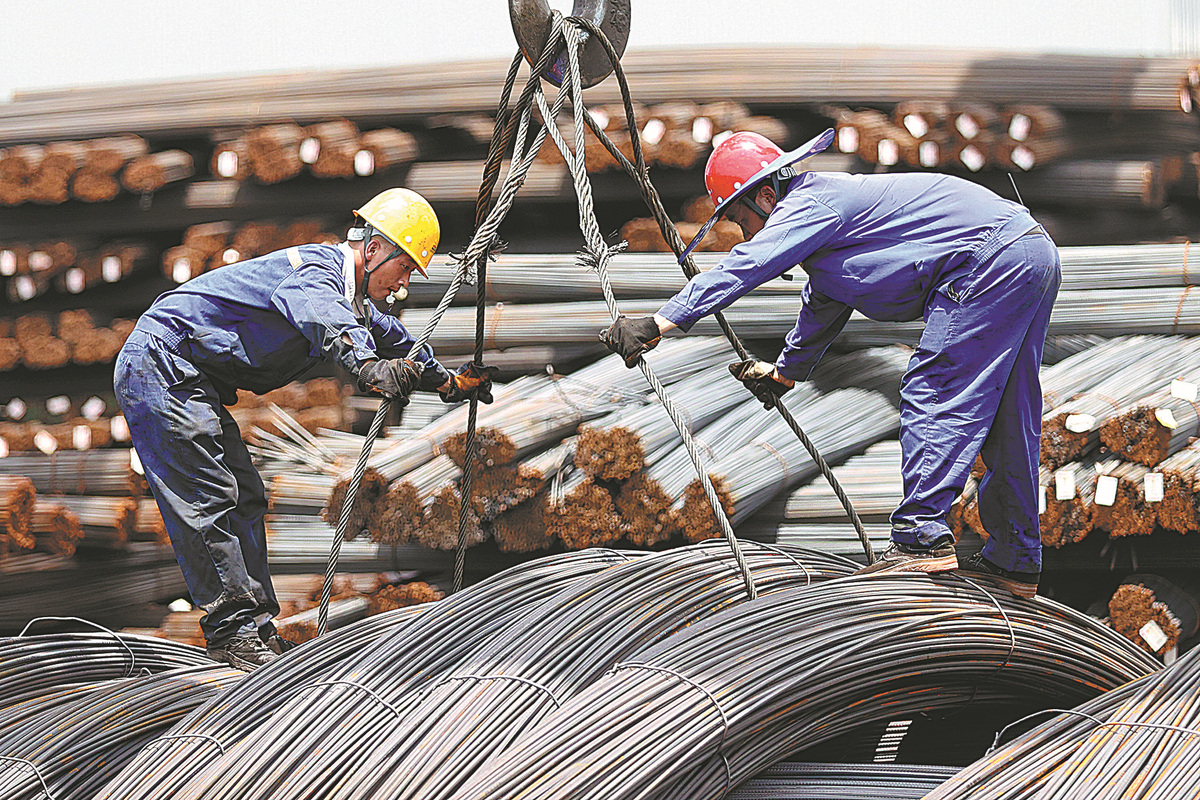
Workers hoist steel bars at a logistics park in Huzhou, Zhejiang province. YAO HAIXIANG/FOR CHINA DAILY
Amid intensifying downward pressure, China's steel industry must accelerate its pursuit of innovation-driven high-quality development to control output, cut inventories and increase added value of steel products, government officials and industry experts said on Friday.
They also said the industry will likely experience demand recovery to a certain extent in the coming months.
"The Chinese economy has already been stabilized for a rebound after a dip in growth during the second quarter, as the COVID-19 epidemic is getting better controlled and pro-growth policy measures unleash effects," said He Wenbo, executive chairman of the China Iron and Steel Association, at an industry event.
"We expect steel demand in the third quarter will improve gradually from the second quarter, although not rapidly," he said, forecasting steel demand will also pick up step by step throughout the second half of the year.
On Thursday, a meeting of the Political Bureau of the Communist Party of China Central Committee urged efforts to consolidate the uptrend in economic recovery.
The meeting stressed that macroeconomic policies should play an active role in expanding demand, and fiscal and monetary policies should effectively make up for the lack of social demand.
It also called for work to ensure the real estate market remains stable, adhering to the principle that "houses are for living in, not for speculation."
The CISA head also predicted infrastructure investment is likely to increase in the third quarter. As for the downstream sectors, the real estate sector is getting stabilized, shipbuilding orders have piled up, and output and sales of vehicles are also on the rise, he said.
Yet, the industry is facing multiple uncertainties and challenges. Therefore, it must step up efforts for high-quality development, analysts and officials said.
Data from the National Bureau of Statistics showed average daily output of crude steel was on the rise month by month in the January-May period despite weak demand. In May, the average daily output was around 3.12 million metric tons, which meant the yearly output would reach 1.1 billion tons if such high-level output continues.
In late June, combined inventories of key member enterprises of the CISA stood at 16.95 million tons, up 50 percent from the start of the year, and growing 23.1 percent year-on-year, the association said.
Zhang Haideng, deputy director of the department of raw materials industry at the Ministry of Industry and Information Technology, said at the CISA event the industry is being tested by the most severe challenge since the slashing of overcapacity began in 2016, and needs to coordinate development with upstream and downstream industries.
The steel industry must keep confidence and continue to speed up green and low-carbon transformation, adapt to the new reality with proactive supply-side reforms and product innovations, in order to rein in inefficient supplies and spur new demand. It should also coordinate COVID-19 prevention and control with production activity, he said.
Steel enterprises should reduce output and the authorities concerned should strengthen efforts to stabilize coking coal price, as the recent elevated prices of key raw materials increased the existing pressure on the industry, said Xu Xiangchun, information director and an analyst with iron and steel consultancy Mysteel.
"Against the excessive supplies and steel price plunge, controlling costs and improving efficiency are important for enterprises, but what's more important is reducing output proactively," he said.